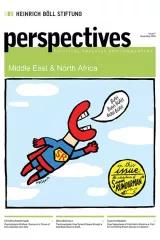Perspectives #7 - Rumours (November 2014)
Hardly anything is more challenging than writing about something that is essentially nothing more than ‘hot air’. Yet anyone who has been affected by rumours is familiar with their unhallowed dynamics, and the serious consequences they can entail. Rumours fulfil social functions. They serve as a medium through which unfulfilled hopes or unspecific fears can be voiced. They bond and drive a wedge between people and population groups at the same time. They can destroy reputations, credibility and even lives.
Some rumours develop out of misunderstandings and quickly take on a life of their own. Others are spread deliberately in order to enhance the legitimacy of a person’s position – or at least to undermine the credibility of the respective other party. Many rumours contain true information that, taken out of context or distorted, suddenly assumes an entirely different meaning. Many a half-truth is inflated and develops into one of those contemporary legends, which a ‘friend of a friend’ has certainly experienced for themselves. Others, with the addition of more and more details, morph into elaborate conspiracy theories, often becoming more popular than simpler and more obvious explanations.
The possibility of identifying the truth is not always given. However, even when possible, the deceptive depiction persists. The internet is flooded with pseudo-truths that have been clearly refuted and nonetheless, in a zombie-like fashion, are periodically revived. A great deal of what occurs in Syria could easily be mistaken for footage from a horror film. The image of a Syrian Christian woman who was allegedly murdered with a cross found much attention on Twitter – an image that was in fact taken from an actual horror movie. In times of upheaval and uncertainty, and especially under circumstances that make it difficult to access reliable information, rumours develop to their most disastrous effect.
In this issue, Hiba Haidar shares her memories of a day in 1975, a day on which a rumour changed her life. Journalist and documentary filmmaker Christina Foerch Saab reports on interviews conducted with combatants from different factions in the Lebanese Civil War, which focus on the role rumours play in psychological warfare. Haid Haid explains how rumours about the Syrian presidential elections persuaded Syrians in Lebanon to vote - even those who viewed the elections as illegitimate. Syrian authors Mohammad Dibo, and Dima Wannous describe how the past and present political climates in Syria have shaped the development of, and belief in rumours. The Syrian intellectual Yassin Al Haj Saleh shares his experiences of how rumours of their imminent release haunted political prisoners and their family members. Moroccan journalist Salaheddine Lezaimi analyses how rumours about the Moroccan monarchs and their ongoing role in the fraught relationship between the press and the palace were exploited by various political factions, and his fellow countryman Omar Brouksy addresses the anthropology of rumour. Rumours do not only assume a role in high politics, but also have an effect on local affairs. In this context, Susanne Baaklini reveals how disinformation impedes the campaigns of civil society organisations in the struggle over public space in Beirut.
Regardless of how adverse the circumstances, nobody is helplessly exposed to the dissemination of rumours. While most people view the internet as the main cause for the more and more rapid dissemination of rumours, it simultaneously is the internet that allows for their swift exposure as myths. In an interview with Noor Baalbaki, Jad Melki, Professor at the American University of Beirut, describes how annual summer schools on ‘Media Literacy’ instruct students and journalists in critical thinking. Lastly, the organisation Dawlaty, in cooperation with hbs, held an initial workshop on ‘Rumour Control’ – a learning process for everyone involved, and continued in further workshops on the same topic. This Perspectives issue is illustrated by Mazen Kerbaj.
Bente Scheller, Dorothea Rischewski, Joachim Paul & René Wildangel
Product details
Table of contents
Get the Hell out of Here - They Are Coming to Kill Us - Hiba Haidar
Psychological Warfare: Rumours in the Times of the Lebanese Civil War - Christina Foerch Saab
Regime Strategy and Opposition Tactics: Rumour in Syria - Mohammed Dibo
The Iconoclasts: How Syrian Citizens Brought a God back down to Earth - Dima Wannous
One Aspect of the History of Political Rumour in Syria - Yassin Al Haj Saleh
Morocco: the Monarch and Rumours - Salaheddine Lemaizi
The Anthropology of Rumour - Omar Brouksy
Critical Thinking, Down to a T - Noor Baalbaki interviews Dr. Jad Melki
